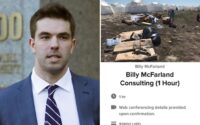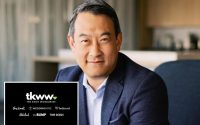‘There’s a non-zero chance’ of AI wiping out humanity
Billionaire Elon Musk and ex-Google CEO Eric Schmidt are stepping up warnings about their concerns that rogue advanced artificial intelligence could one day have deadly consequences for humanity.
Schmidt argued that AI is an “existential risk” to humanity that could result in “many, many, many, many people harmed or killed” as it becomes more advanced in the coming years. Musk compared the potential risks to the doomsday scenario from James Cameron’s 1984 sci-fi film “Terminator.”
“There are scenarios not today, but reasonably soon, where these systems will be able to find zero-day exploits in cyber issues, or discover new kinds of biology,” Schmidt said at the Wall Street Journal’s CEO Council Summit on Wednesday.
“Now, this is fiction today, but its reasoning is likely to be true,” Schmidt added. “And when that happens, we want to be ready to know how to make sure these things are not misused by evil people.”
Speaking at the same conference a day earlier, Musk warned there is a “non-zero chance” that rogue advanced artificial intelligence could annihilate humanity.
“There’s a non-zero chance of it going Terminator. It’s not zero percent,” Musk said. “It’s a small likelihood of annihilating humanity, but it’s not zero. We want that probability to be as close to zero as possible.”
Musk also raised the possibility that an advanced AI system could decide to place humanity “under strict controls.”

AI could, for example, decide to seize “all the computing systems and weapons systems of Earth and effectively being like some sort of ‘uber-nanny.’” he said.
“One way to achieve world peace is to take all the weapons away from the humans so they can no longer use them and to punish any humans that engage in extraterritorial activity,” Musk added.
Musk and Schmidt are among the most prominent tech leaders urging caution in the development of AI – though they have taken differing approaches to the problem.
In March, Musk joined more than 1,000 experts in advocating for a six-month pause on advanced AI products until proper safety measures and guardrails could be put in place.
At the time, the experts said AI’s risks included the spread of “propaganda and untruth,” major job losses and even the possible “loss of control of our civilization.” Others, such as the “Godfather of AI” Dr. Geoffrey Hinton, have warned that “bad actors” will use AI to sow chaos.
Schmidt has argued against a six-month pause in AI development, stating that a delay would “simply benefit China” and other international rivals, who would gain an advantage over the US.

“What I am in favor of is getting everybody together ASAP to discuss what are the appropriate guardrails,” Schmidt said last month.
Earlier this week, US stocks briefly plummeted after a AI-generated photo of a fake explosion at the Pentagon went viral on social media. Russian state media outlet RT was among the accounts that posted the image.
Earlier this month, OpenAI CEO Sam Altman – whose firm created the massively popular ChatGPT – called on lawmakers to establish regulations governing AI companies and products.
Speaking at the WSJ event, Musk called advanced AI a “double-edged sword” for humanity that could bring about both major positives and disastrous consequences.
“If you have a genie that can grant you everything that can also do anything, that presents a danger,” Musk said.
Musk has been critical of AI even as he pursues the technology through his own businesses – including a generative AI project that will directly compete with OpenAI’s ChatGPT.

“I’m definitely not of the school of automatically giving my kids some share of the companies, even if they have no interest or inclination or ability to manage the companies. I think that’s a mistake.”
Musk touched an array of pressing topics during his appearance at the WSJ event, including his plans for Twitter following the appointment of new CEO Linda Yaccarino and geopolitical tensions related to China and Taiwan.
At one point, Musk said he has provided potential succession plans for future leadership at his businesses – a dilemma he described as “one of the toughest, age-old problens.”

Musk also ruled out the possibility that his children will eventually tapped to replace him at the helm of companies like Tesla and Twitter.
“I’m definitely not of the school of automatically giving my kids some share of the companies, even if they have no interest or inclination or ability to manage the companies. I think that’s a mistake,” Musk said.


